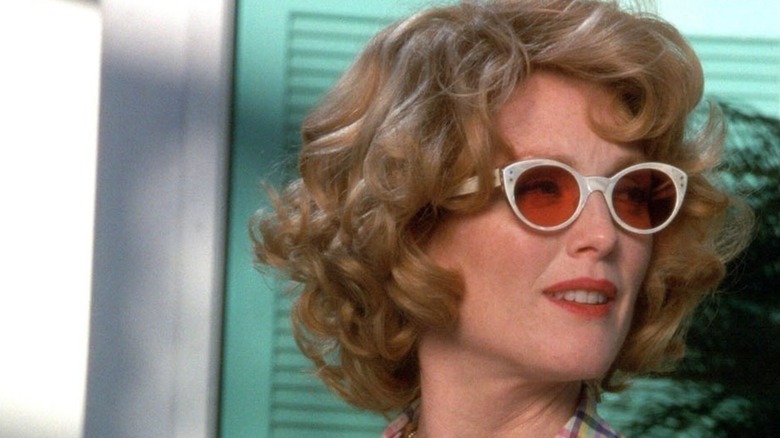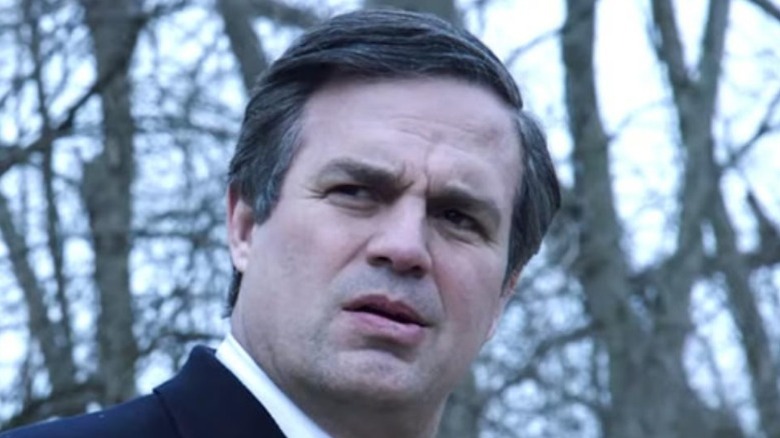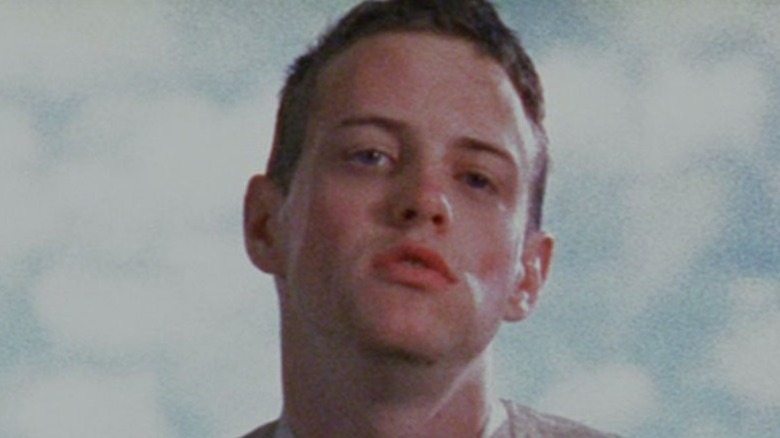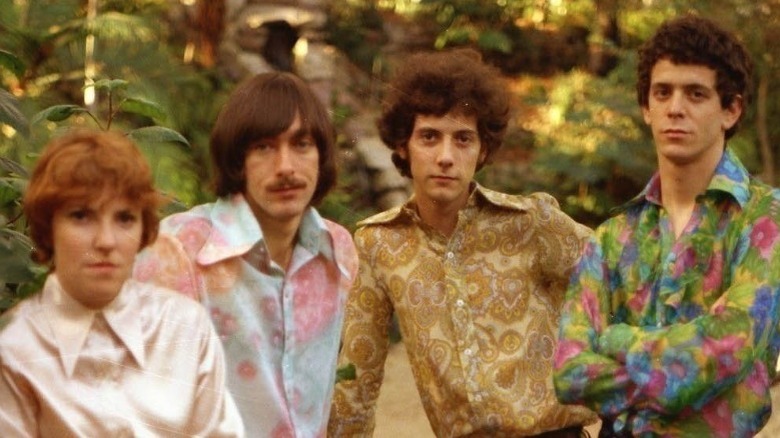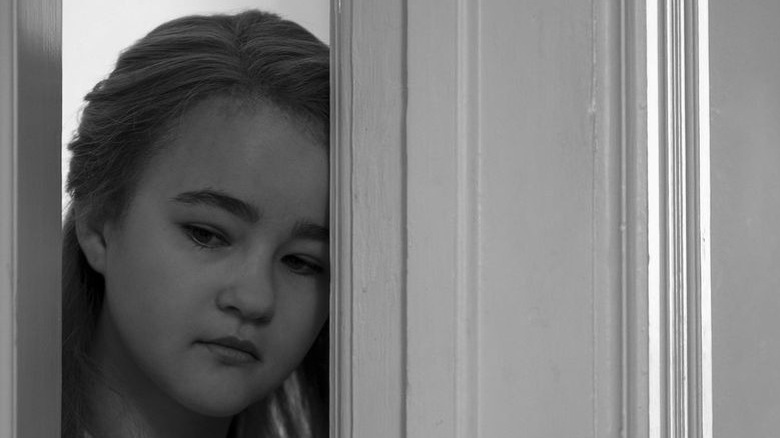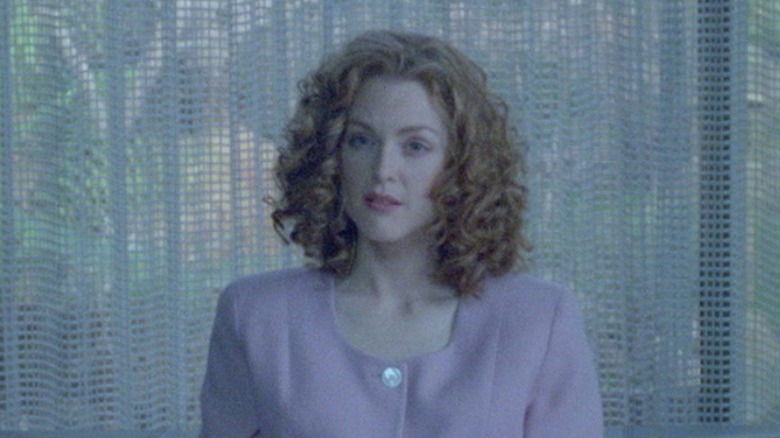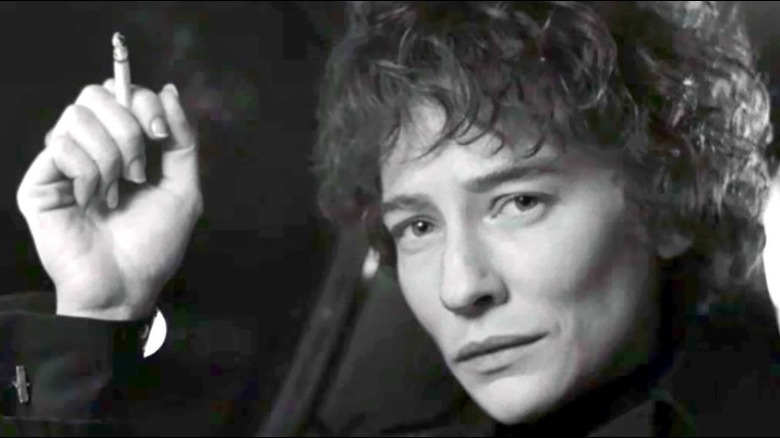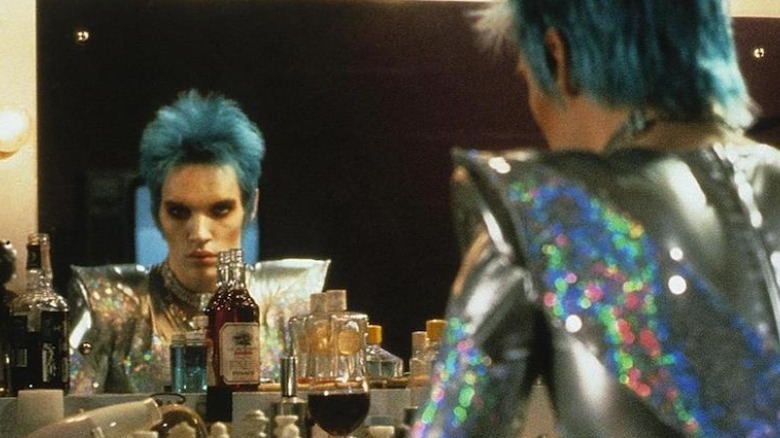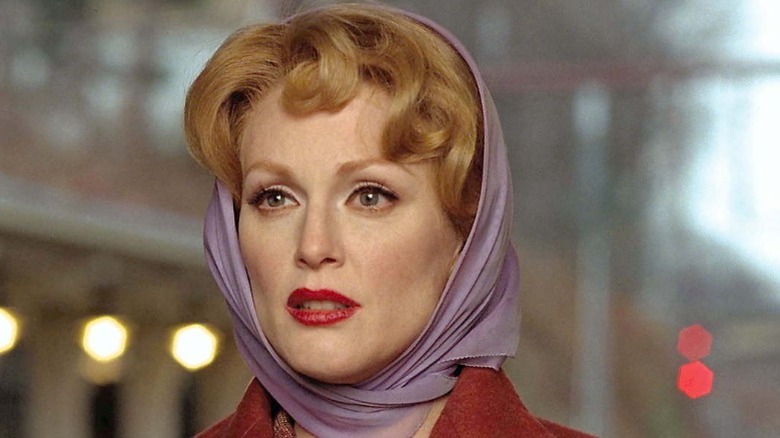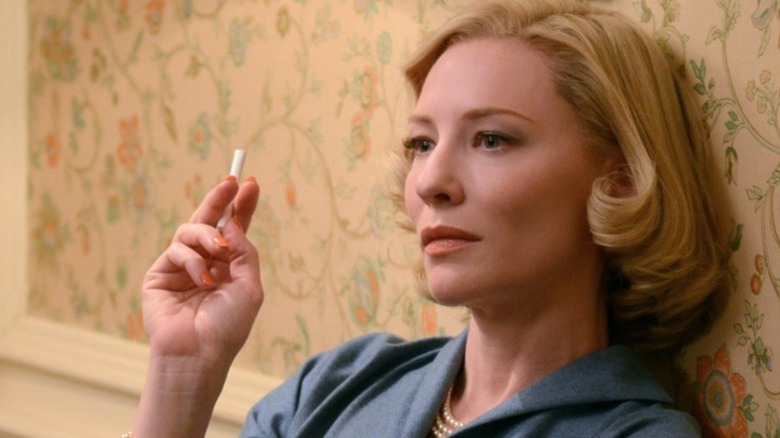Every Todd Haynes Film Ranked Worst To Best
We may receive a commission on purchases made from links.
Considered to be one of the filmmakers at the forefront of the new queer cinema movement, writer-director-producer Todd Haynes has become an established auteur who is known for his avant-garde musical biopics and lush historical dramas. Haynes often uses these genres to explore themes of queerness, artistic counterculture, and American suburbia with his trademark visually striking and experimental style. He has created cult classics like "Velvet Goldmine" and "Poison," as well as critical favorites such as "Far from Heaven" and "Carol."
Throughout his varied career, Haynes has also become known for his frequent collaborations with actors like good friend Julianne Moore, Christian Bale, and Cate Blanchett, the latter of whom Haynes has directed in two Oscar-nominated roles. With Haynes' latest film and debut documentary feature "The Velvet Underground," now available to stream on Apple TV+, we took the opportunity to revisit Haynes' broad and acclaimed filmography and rank his features from worst to best.
9. Dark Waters
"Dark Waters" (2019) is a notably different film from the rest of Todd Haynes' filmography in that it's a standard political drama that lacks his trademark experimental flair and typical artistic perspective. Instead, it doesn't feel like a Haynes film at all, but rather a standard entry in the political drama canon. Mark Ruffalo stars as Robert Bilott, a corporate defense attorney who begins an Erin Brockovich-like investigation of the massive company DuPont when an acquaintance of his grandmother brings him evidence that suggests DuPont is responsible for environmental pollution.
As Robert begins to look into the documentation, he discovers a deadly chemical, PFOA, is in a number of mass-produced DuPont products, from carpeting to pots and pans. He attempts a class action suit before bringing individual cases against the giant conglomeration. Ruffalo delivers a compelling lead performance, and the production clearly cares about the subject matter, but "Dark Waters" is largely missing that special something that takes Haynes' films from good to great. On the whole, "Dark Waters" is still a competently made and moving film that handles its dense subject matter well.
8. Poison
Todd Haynes' 1991 debut feature, "Poison," is considered to be one of the first films of the new queer cinema era. The film is structured in three individual acts: "Hero" sees a 7-year-old boy kill his father and fly out the window; "Horror" follows a doctor who drinks a sexual elixir that turns him into a monster; "Homo" finds two men reunited in prison. As a whole, the three stories explore themes of violence, sex, and social ostracism. Each segment is shot in a distinct film style, creating an early representation of what would become Haynes' trademark experimental visual style.
While not a commercially distributed film, "Poison" was controversial and notorious at the time of its release amidst the height of the AIDS epidemic for its depiction of homosexual themes. The film sparked outrage and intrigue in turn, with critics walking out of the screening at Sundance before it ultimately won the Grand Jury Prize. Additionally, the National Endowment for the Arts' funding for "Poison" fueled a national debate over taxpayer dollars that drew more people to the box office and cemented Haynes as a director with a point of view. "Poison" was also nominated for the Film Independent Spirit Award for Best Director and Best First Feature.
7. The Velvet Underground
Throughout his career, beginning with his notorious student short film "Superstar: The Karen Carpenter Story" (1987), Todd Haynes has had a special relationship with music and musicians, returning again and again to prominent musical artists as inspiration to tell new stories. In that sense, his 2021 documentary, "The Velvet Underground," is a match made in heaven between director and subject.
For those who don't have much background knowledge of the seminal band or its surrounding history, they may be a bit lost as Haynes takes little time to ground viewers. Instead, he creates a viewing experience that takes the audience on a journey through The Velvet Underground's past. In typical Haynes fashion, it's a visually striking documentary that beautifully melds archival footage, recordings, and new interviews in a composition of color and sound to depict a surreal pop art palette befitting the avant-garde band and one-time darling of Andy Warhol. The first documentary to fully explore the iconic band's history, "The Velvet Underground" was nominated for the Golden Eye prize for documentary films at the Cannes Film Festival.
6. Wonderstruck
Todd Haynes' first take on the classic family film is a charming adaptation of Brian Selznick's young adult novel of the same name. "Wonderstruck" (2017) tells two stories 50 years apart. In 1927, a deaf girl named Rose (Millicent Simmonds) escapes her bleak home life with her scrapbook chronicling the life of famous silent film actress Lillian Mayhew (Julianne Moore). In 1977, Ben (Oakes Fegley) is recovering from the sudden loss of his mother when another tragedy strikes that causes him to lose his hearing.
Both Rose and Ben set out on their own in New York City to look for answers; Rose for her mother and Ben for his father. While set 50 years apart, Rose and Ben's stories intersect in a surprising, moving, and hopeful climax that reinforces the film's themes of identity and family. While Haynes' take on the children's movie may not be as straightforward as most entries in the genre, he lends "Wonderstruck" much-needed flair. Rose and Ben's stories are given distinct visual and thematic styles that add to the cinematic world of the characters and create an overall emotional and heartfelt film. Though a quieter entry in Haynes' filmography, "Wonderstruck" was nominated for the Cannes Film Festival's top honor, the Palme d'Or.
5. Safe
Todd Haynes' second feature is a fascinating meditation on isolation and illness with relevant themes that ring true more than 25 years after its release. 1995's "Safe" is a slow-burn social thriller that follows Carol (Julianne Moore), a suburban housewife who leads a quiet and unremarkable life until she begins experiencing sudden and seemingly random physical health symptoms. As she tries to figure out why she's getting sick and what is happening to her, she has to deal with the general lack of empathy, concern, and belief from the people closest to her, including her generally unfeeling husband.
When Carol finds a chemical-free wellness community, she unlocks not only a possible path to healing, but begins to learn who she is, safe in the arms of people who understand her terrifying illness. The film's exploration of public health and the social ramifications of illness remain painfully poignant; at the time of its release, "Safe" was viewed as an allegory for the AIDS epidemic, and in the COVID-19 era, its resonance is still remarkably powerful and thoughtful. "Safe" was nominated for four Film Independent Spirit Awards including a Best Screenplay and Best Director nod for Haynes. The film also marked the first of many collaborations between Haynes and Moore.
4. I'm Not There
Todd Haynes' second and more infamous musical biopic, 2007's "I'm Not There," tells Bob Dylan's life story in a way that only the unique filmmaker can. The movie features six different actors portraying the famous songwriter as different characters at key moments throughout his life. Haynes once again employs his firm handle on film and genre conventions to lend each version of Dylan his own style and take. While the many characters and film styles create a somewhat fractured and chaotic narrative, "I'm Not There" isn't interested in a conventional linear biopic. Instead, it creates a general impression of each character's point of view and how they make up who Bob Dylan is as a whole.
The result is a wholly unique take on the rote and well-trodden biopic genre, one that showcases Haynes' abilities as a visual director as well as a director of actors. In particular, Cate Blanchett's take on Dylan feels both accurate and entirely original. She received notable acclaim for the film, earning her a Film Independent Spirit Award for Best Supporting Female, Golden Globe for Best Supporting Actress, and an Academy Award nomination for Best Supporting Actress. "I'm Not There" also earned Haynes a Film Independent Spirit Award nomination for Best Director and Best Feature.
3. Velvet Goldmine
Originally conceived as a David Bowie biopic, Todd Haynes' third feature is a rollicking, glittering tribute to the glam rock era. A fictional amalgam of glam rock and punk rock figures combined with an Oscar Wilde fairytale narrative framing, "Velvet Goldmine" (1998) tells the story of famous and influential musician Brian Slade (Jonathan Rhys Meyers). As Slade forms his artistic persona and achieves fame, he crosses paths with Curt Wild (Ewan McGregor), a rough and tumble rock star. The two begin an intense affair that is doomed from the start, estranging Slade from his wife and one-time manager Mandy (Toni Collette).
Meanwhile, a young closeted boy, Arthur (Christian Bale), begins to discover himself through Brian Slade's music, leading him on a journey to find out what happened to the musician years after his alleged death. "Velvet Goldmine" may be Haynes' most visually extravagant film, with vivid colors and incredible production design that would become a trademark for Haynes' films to come. While more of a cult classic than some of Haynes' other films, "Velvet Goldmine" was still critically acclaimed and was nominated for Best Director and Best Feature at the Film Independent Spirit Awards where it also won Best Cinematography. The film was also nominated for the Palme d'Or at the Cannes Film Festival where it ultimately was recognized for Best Artistic Contribution.
2. Far from Heaven
Made in the vein of classic films about social issues, 2002's "Far from Heaven" is a lush 1950s period drama that explores the hidden taboos and secrets of American suburbia. The film tells the story of Cathy (Julianne Moore), a housewife whose life turns upside down when she finds her husband (Dennis Quaid) having an affair with another man. Isolated, confused, and seeking comfort, Cathy befriends her gardener, Raymond (Dennis Haysbert), a kind and charming Black man. As the two grow closer, they have to face the realities of the racist social norms around them, even as Cathy's husband faces his own inequities that hold him back.
"Far from Heaven" is a beautiful and heartbreaking domestic drama that typifies Todd Haynes at his best, exploring the perspectives of the marginalized and lesser-known stories of history. The film was a critical darling that helped launch Haynes into broader critical and mainstream recognition and earned Haynes the Film Independent Spirit Award for Best Director and Best Feature. "Far from Heaven" also earned the filmmaker a Golden Globe and Academy Award nomination for Best Original Screenplay, while Julianne Moore received an Academy Award nomination for Best Actress.
1. Carol
Arguably Todd Haynes' best-known film, "Carol" (2015) is adapted from Patricia Highsmith's novel "The Price of Salt," the first lesbian novel with a happy ending. The film tells the story of Therese (Rooney Mara) an introverted department store employee whose true passion is photography. Therese and Carol (Cate Blanchett) meet when Carol comes in to shop for her daughter's Christmas gift, but they soon reconnect over lunch and strike up a friendship. While Therese is bored with her day-to-day life, she's drawn to the older, alluring Carol who encourages her interests.
Even as they're attracted to each other, they know their romance is one that will change their lives, leading Carol to choose between her own happiness and her family. "Carol" was widely acclaimed and has been heralded as a new queer classic. The film was also nominated for a Golden Globe award for Best Director and Best Motion Picture – Drama. "Carol" also received several Film Independent Spirit Award nominations including Best Director, Best Feature, and Best Screenplay. The movie was nominated for the Palme d'Or at the Cannes Film Festival where it ultimately won the Queer Palm and earned Rooney Mara Best Actress. "Carol" also earned Cate Blanchett her second Oscar nomination with screenwriter Phyllis Nagy garnering an Academy Award nomination for Best Adapted Screenplay.
